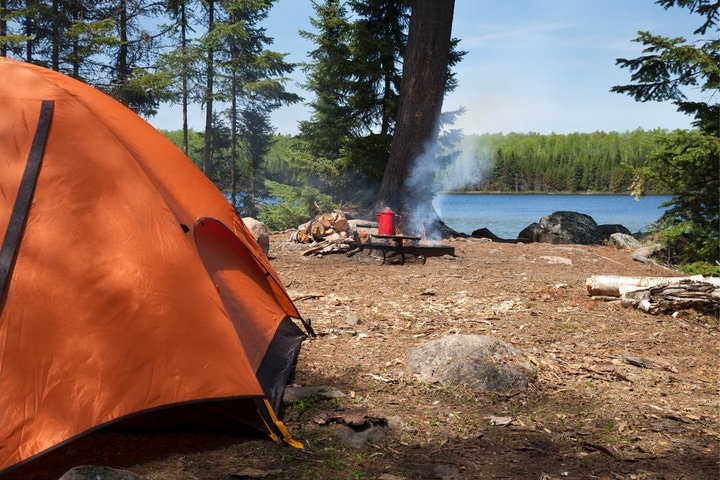Key points
- Norovirus is a very contagious and spreads easily on camping trips, especially when clean water supplies can be limited.
- Watch for early symptoms of norovirus, such as stomach pain and nausea, before the trip.
- Take precautions during the trip to prevent norovirus.
- Isolate people who are sick from other campers.

Overview
It is easy to spread norovirus from infected people to others on camping and river rafting trips.
In these settings, handwashing and clean water supplies can be limited. These factors, along with people sharing small spaces, can lead to quicker spread of norovirus among people on the trip.
Whether you are camping for just a night or backpacking across the country, know how to avoid getting sick from norovirus.
Exposure
Norovirus is spread when virus particles from feces (poop) or vomit enter someone’s mouth. This usually occurs when people eat, prepare, or touch food that has been infected; or when people eat without washing their hands first.
Before the trip
Norovirus is very contagious. Early symptoms of norovirus include stomach pain and nausea. Before leaving, check in with each camper in your group to make sure they are feeling well.
- If you are feeling unwell: It is better to stay home and miss the trip than to risk infecting everyone else with the illness.
- For larger group trips: Consider using a symptom screening form to check for illness among campers.
During the trip

Don't use just hand sanitizer
While hand sanitizer can kill some germs, it does not work well against norovirus. Wash your hands with soap and water thoroughly and frequently for at least 20 seconds. It is most important to wash your hands:
- After using the toilet or changing diapers.
- Before eating, preparing, or handling food.
- Before giving yourself or someone else medicine.
If no handwashing stations or bathrooms are available, bring a small bar of biodegradable soap. This mean it can be easily broken down by the environment. Have clean water available to pour onto your hands; do this at least 200 feet away from water sources.
Drink and cook with only clean water
Norovirus particles and other germs can spread through the water you drink and use for cooking. Most portable water filters do not remove viruses like norovirus. Boiling water is the most reliable way to kill germs.
Keep bathroom areas away from your food
If no bathroom facilities are available, create a toileting and washing area at least 200 feet away from:
- Food preparation areas
- Water sources
- The campsite
Dispose of human poop by burying it at least 8 inches deep and downstream from where people collect water.
Consider using bleach wipes
Consider carrying bleach wipes to clean common shared surfaces before touching them, such as toilet seats or doorknobs.
It is easy for bathroom areas to collect norovirus particles over time if anyone sick uses them. Cleaning and disinfecting surfaces are especially important for areas where different groups visit over a shorter time period.
Prepare and cook your food properly
Carefully wash fruits and vegetables with clean water (treated or provided at campsite) before eating them to clean off any norovirus.
If anyone gets sick

Do not let them handle food
- People who are sick with norovirus can easily spread illness to others in the group. They should not make, serve, or touch food for others.
- Avoid preparing food for others for at least 2 days (48 hours) after symptoms end.
Isolate sick campers
- People who are sick should not use the same toilets or sleeping areas as those who are healthy.
- Consider carrying extra supplies, if possible, like a hammock, to make separation easier.
- People sick with norovirus should also avoid swimming and other water activities until at least 1 week after their symptoms are gone.
Case studies
In 2022, at least 200 backpackers and river rafters got sick with norovirus at the Grand Canyon National Park. A Morbidity and Mortality Weekly Report about this outbreak of acute gastroenteritis highlights why these prevention measures are important.
